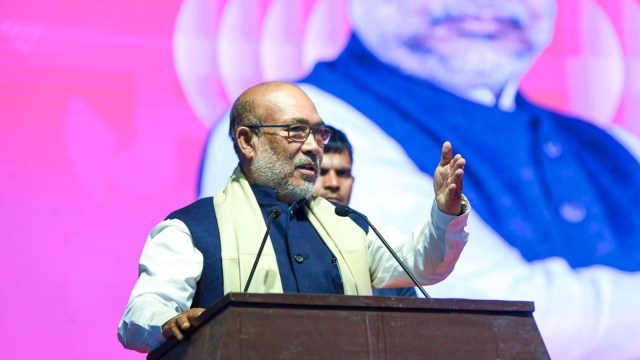
On February 9, just one day before the beginning of the Manipur Assembly session, N Biren Singh – a chief minister who had envisaged bringing the Valley and the Hills closer – tendered his resignation. He was a CM of whom Home Minister Amit Shah had once asserted on the floor of the Parliament that there was no question of removal because he had been cooperating with the Centre. However, the last 21 months turned out to be his political odyssey. Singh has overseen the militarisation of society, the deepening of ethnic polarisation, and the censorship of free speech. Can Singh’s resignation reverse the extraordinary civilian crisis in the state?
After the BJP came into power in Manipur in 2017, Singh began the Meeyamgi Numit programme, allowing people to contact him directly. Similarly, there were the “Go to Village” and “Go to Hills” programmes. All these were attempts to bring the people closer to the government. To many observers, these programmes were political shows rather than an actual delivery of benefits. The “the war on drugs” and poppy cultivation have had differential social and political impacts across the state and communities. While evicting people from the reserve forest areas in the Meitei-dominated Thoubal district, there were criticisms due to a lack of humanitarian alternatives. However, when an eviction occurred in a reserve forest area in the Churachandpur district, it led to the question of violating tribal land ownership and their distinct identity. Similarly, in some parts of the state, Singh’s campaigns against poppy cultivation evoked criticism for not providing alternative livelihoods.
Singh’s tenure was also a time of ambiguous relationships between state and non-state actors, partly as counter-insurgency measures and partly to silence the opposition. Civil society groups known for their activism in the past almost lost their voices and spaces. During his predecessor’s time, there were several cases of fake encounter killings. But active mobilisations of autonomous rights groups had always been vocal in questioning such cases. During Singh’s time, he appeared to have mastered the art of keeping civil society groups dependent on him and even critics within his political loop. But the Manipur violence that began in May 2023 and has lasted 21 months shattered that illusion.
Manipur witnessed the most prolonged internet shutdown from May to December 2023. The Armed Forces Special Power Act was extended in certain areas of the Valley districts. By November 2024, the Centre sent 288 companies of Central Security Forces to quell the conflict. Yet, not only did the violence continue unabated, armed groups also flexed their muscles openly, even under the eyes of security forces.
The appointment of a retired Home Secretary of India as the Governor and his review of the security situation in Manipur immediately after his assumption of power without the CM have been matters of public discussion. As per Article 167, the CM informs the Governor of the executive decisions regarding administration and legislative issues. In Manipur’s case, the Governor surpasses a democratically elected leader while reviewing law and order. While Article 355 denotes the situation of “external aggression” and “internal disturbance”, the Union Ministry of Home Affairs stated that ethnic killings in the state fall under the state subject. However, in January 2025, the state’s elected leaders started looking towards the Governor as the head of the state to bring back peace.
Singh’s long overdue resignation is a product of the 21-month-long turmoil in Manipur. Even while the search for “alternative arrangements” goes on, we must not forget the killings, the arsons, the looting of arms, and the abduction of people that have been a regular state of affairs. A return to normalcy is unlikely to happen any time soon.
The writer teaches political studies in the Special Centre for the Study of North East India, Jawaharlal Nehru University, New Delhi